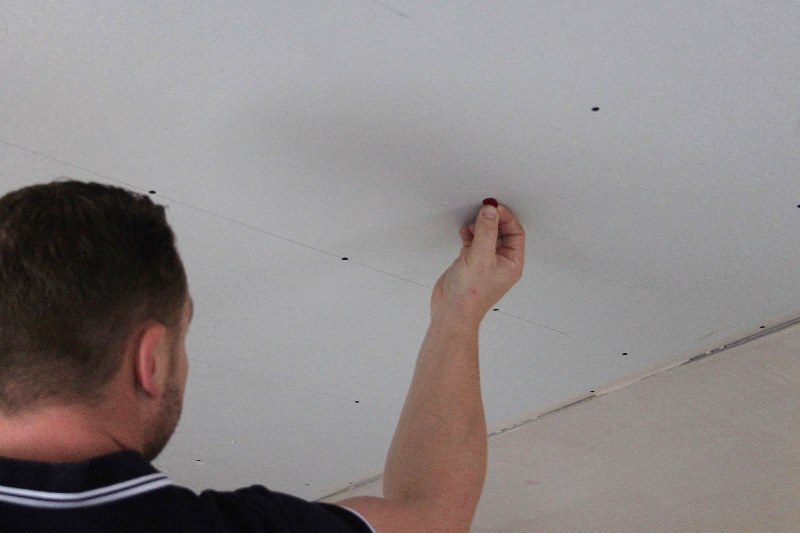
Lee Jones catches up with a Sheffield-based spreader who’s invented a spot on solution for the trades – Plasterspot.
It all began when we were working on a job where some downlights were being installed, and somehow the drawing of where they were supposed to go had been misplaced,” explains 35-year-old, Charles Ellis. “There was a bathroom above that ceiling with a tiled floor, so there was no way I could lift floorboards. In the end all I could do was tap on the ceiling to found out where the joists were, and try and work out where the positions for the lights should have been.
“I had the germ of the idea then but, to be honest, the solution was so simple that I thought it must have already been invented, but after a good deal of research I realised that there was nothing like it on the market.”
That light bulb moment was some three years ago  now but, with the able assistance of business partner and investor Phil Hardy, Charles has since successfully launched Plasterspot. His invention is essentially a coin sized indicator sticker, available in packs of 25, which are placed individually on the plasterboard surface prior to going over with a skim coat of plaster. The dye on one side of the sticker then bleeds through the drying plaster leaving an accurate indication of where hidden cables, pipes, and joists are, whilst it can also mark the location of downlights, radiators, wall sockets, switches and much more.
now but, with the able assistance of business partner and investor Phil Hardy, Charles has since successfully launched Plasterspot. His invention is essentially a coin sized indicator sticker, available in packs of 25, which are placed individually on the plasterboard surface prior to going over with a skim coat of plaster. The dye on one side of the sticker then bleeds through the drying plaster leaving an accurate indication of where hidden cables, pipes, and joists are, whilst it can also mark the location of downlights, radiators, wall sockets, switches and much more.
The clear, well-defined spot will give later trades an accurate marker for drill points, or water and electrical feeds, without the need to rely on drawings. As a result, all guesswork is removed and potentially costly and time consuming remedial work in rectifying damage when fixings have been positioned incorrectly can be avoided. As many tradesmen turned inventors have found before him, however, the road from time saving solution to finished product can be an arduous journey of prototyping and testing, not to mention sourcing a company that can actually make the thing, but Charles is in the privileged position of being in full command of the production process, from a site in Tideswell, Derbyshire.
“I initially came up with the idea as a solution for downlights but the great thing is that tradesmen are actually finding their own uses for it.”
For all trades
 “At first I tried making it on my own and trying it out on my own jobs just to prove to myself that it could actually work, but Phil’s knowledge of manufacturing proved invaluable in taking the idea to the next level. We also had to be sure that the dye will in no way react with the gypsum plaster and that the paper was thin enough to be concealed behind what is only a 2 ½ – 3mm skim coat but that the patented dye will still bleed through to leave the tell-tale mark. It’s been a process of trial and error but just in talking to other builders and plasterers I came to the conclusion very quickly that there was a market for what we were trying to create.
“At first I tried making it on my own and trying it out on my own jobs just to prove to myself that it could actually work, but Phil’s knowledge of manufacturing proved invaluable in taking the idea to the next level. We also had to be sure that the dye will in no way react with the gypsum plaster and that the paper was thin enough to be concealed behind what is only a 2 ½ – 3mm skim coat but that the patented dye will still bleed through to leave the tell-tale mark. It’s been a process of trial and error but just in talking to other builders and plasterers I came to the conclusion very quickly that there was a market for what we were trying to create.
“I initially came up with the idea as a solution for downlights but the great thing is that tradesmen are actually finding their own uses for it. If you’re working on a kitchen extension, for instance, and you’ve removed units for replastering you can pinpoint exactly where they might need to go back with Plasterspot.
“People have also been using them to mark the position of radiator brackets so plumbers can reposition them in exact relation to the pipework and in each instance it’s a quick and easy solution. The ultimate aim is to get it into all wholesalers because it’s something that can be carried around very easily and is very simple to use.”








